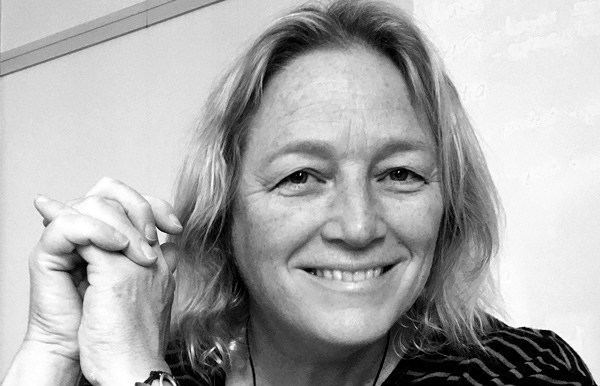Since the early 2000’s, Sarah Walker has been writing on iconic Australian TV shows like Neighbours, Home & Away and Wentworth.
As a proud lesbian herself, she has also been instrumental to the portrayal of the LGBTI community on screen in Australia.
“I freak out thinking about how many hours of television I’ve written,” she says. “Of all those hours, I’ve probably spent 90% of them in heterosexual land. So I always do look for chances and opportunities to tell stories that I am interested in romantically.”
Walker says that for a long time Australian television writers have had to write the same show over and over again in different variations, and it continues to this day.
She says a lot of commercial networks still believe Australians want to watch a certain type of television with a certain formula and certain characters, and that’s why free-to-air television is dying.
While Walker has made significant moves towards inclusion on screen, her creation of gay characters and plots on TV hasn’t always been positive.
In 2009, she was approached by the producers of a long-running series to write a gay storyline for a character for eight weeks.
“There was a massive backlash in the media after it went to air, and a network executive came back afterward and said to me ‘we don’t want to see that on our TV screens’,” she says.
“Had that person been indigenous, and someone came in and said ‘we don’t want to see that shit on television’, that would’ve been highly offensive and that person would have been in trouble for talking about it that way. But it was okay to talk about gay people that way and it was considered natural.”
When Walker worked on the show All Saints, she wrote a character to be a lesbian doctor. However, when Walker stopped writing for the show, the character “basically became straight again”.
“I actually expected it to happen,” she says. “I chose for her to be gay, and it was exciting to have a character come in with dogs and a female lover. But we couldn’t see her because we couldn’t afford the guest that would be her girlfriend.”
Walker says a major technical problem with having gay people on television is the limited number of cast members and the fact that they generally have to be matched up romantically.
For example, if you have a cast of six people – three men and three women – and you make two of the men gay, then there is only one man left for the women to be paired with.
Home & Away, an Australian TV show that Sarah Walker has written for.
Walker hasn’t only experienced difficulties and setbacks because of the prevalence of LGBTI themes in her TV work. When she was an author writing young adult books, she was met with hesitation after going to the publisher in 1997 with her first novel ‘The Year of Freaking Out’.
“The publishers wanted it, but I remember them saying ‘we don’t think it’s a first book’,” she says.
“I was trying to figure out what they meant by that, and I realised that because the book was a coming out story, they didn’t want me to be pinned as a gay writer.”
“They didn’t say that to me directly because that would have been homophobic, but they thought if I wrote a heterosexual novel first then it would give me more leeway going forward.”
While she says representation is important in the media, she agrees that only a minority of people are interested in LGBTI topics because the LGBTI community is still only a minority.
She also doesn’t care about straight actors playing gay roles because “actors are actors”.
“I really don’t believe that any actor should be stopped from taking any role on the basis of gender or sexuality,” she says.
“That includes trans actors, who should be allowed to play any role, not just a specifically trans person. A trans woman could play Queen Elizabeth and I would be very happy with that, as long as the performance justifies the casting. Cate Blanchett played Bob Dylan in the film I’m Not There, and she is neither a man or a musician.”
Scarlett Johansson recently faced backlash for taking on the role of a transgender man in the newly announced movie Rub & Tug, and withdrew herself from the project last month.
“While I would have loved the opportunity to bring Dante’s story and transition to life,” Johansson told Out magazine, “I understand why many feel he should be portrayed by a transgender person.”
In her statement, Johansson also cites statistics from GLAAD (Gay and Lesbian Alliance Against Defamation) about LGBTI characters dropping 40% in 2017 compared to 2016, “with no representation of trans characters in any major studio release”.
BREAKING: Scarlett Johansson will not play transgender character Dante ‘Tex’ Gill in Rub & Tug. Read her exclusive statement to OUT. https://t.co/kERkKUVILO
— Out Magazine (@outmagazine) July 13, 2018
Walker says that she is positive about the future of on-screen representation because the world is changing.
“What we are getting is this real desire for people to see things they haven’t seen before, and lift the lid on areas of the community where it hasn’t been lifted,” she says.
“We will start to get much more truthful and authentic representations on screen because there is so much more opportunity to broadcast through new broadcasters and different ways of watching.”
She also says that television is the future because “no one is making films anymore”.
“However, when I started out I wanted to write a feature film that would win an Oscar, and I still want that.”
Walker is currently working on an upcoming Netflix original series with Charlize Theron.


